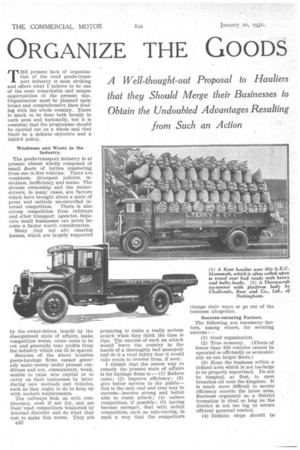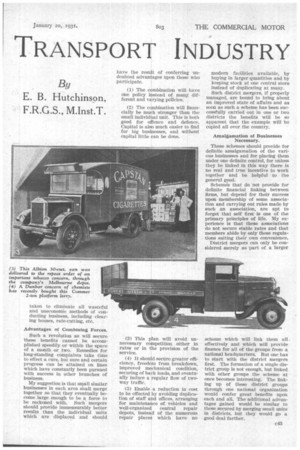ORGANIZE THE GOODS TRANSPORT INDUSTRY
Page 64

Page 65

If you've noticed an error in this article please click here to report it so we can fix it.
TBE present lack of organization of the road goods-transport industry is most striking mid offers what I believe to be one of the most remarkable and unique opportunities of the present day. Organization must be planned upon broad and comprehensive lines dealing with the whole country. There is much to be done both locally in each area and nationally, but it is essential that the programme should be carried out as a whole and that ther be a definite objective and a• settled policy.
Weakness and Waste in the Industry.
The goods-transport industry is at present almost wholly composed of small Ileets of lorries numbering from one to five vehicles. There are weakness, divergent policies, indecision, inefficiency and waste. The diverse ownership and the ownerdrivers, in many cases, are factors which have brought about a state of great and entirely uncontrolled in ternal competition. There is also strong competition from railways and other transport agencies. Separate small businesses can never become a factor worth consideration.
Many (but not all) clearing houses, which are largely supported by the owner-driver, benefit by the disorganized state of affairs, make competition worse, cause rates to be cut and generally take profits from the industry which can ill be spared..
Because of the hbove troubles goods-haulage firms cannot generally make money under present conditions and are, consequently, weak, unable to raise new capital or to carry on their businesses by introducing new methods and vehicles, such as they ought to do to keep up with modern requirements.
The railways look on with complacency, even if not joy, and see their 'road competitors weakened by internal disorder and do what they can to make this worse. They are
c42 preparing to make a really serious attack when they think the time is ripe. The success of such an attack would 'leave the country in the hands of a thoroughly bad monopoly and do it a vital injury that it would take years to recover from, if ever.
I submit that the surest way to remedy the present state of affairs is for haulage firms to :—(1) Reduce costs ; (2) improve efficiency ; (3) give better service to the public— this is the only real and true way to success—become strong and better able to resist attack ; (4) reduce competition, if possible ; (5) having become stronger, deal with unfair competition, such as rate-cutting, in such a way that the competitors change their ways or go out of the business altogether.
Success-securing Factors.
The following are necessaryfactors, among others, for securing success :— (1) Good organization.
(2) True economy. .(Fleets of fewer than 100 vehicles cannot be operated so efficiently or economically as can larger fleets.) (3) Keep the business within a defined area which is not too large to be properly supervised. Do not be tempted, at first, to open branches all over the kingdom. It Is much more difficult to secure efficiency outside the hom'e area. Business organized on a district formation is ideal so long as the district is not too big to secure efficient personal control.
(4) Definite steps should be taken to eliminate all wasteful and uneconomic methods of conducting business, including clearing houses, rate-cutting, etc.
Advantages of Combining Forces.
Such a revolution as will secure these benefits cannot be accomplished speedily or within the space of a month or two. Remedies for long-standing complaints take time to effect a cure, but sure and certain progress can be attained on lines which have constantly been pursued with success in other branches of business.
My suggestion is that small similar businesses in each area shall merge together so that they eventually become large enough to be a force to be reckoned with. Such mergers should provide immeasurably better results than the individual units which are displaced and should have the result of conferring undoubted advantages upon those who participate.
(I) The combination will have one policy instead of many, different and varying.poTicies.
(2) The combination will finandaily be inuCli stronger than the small individnal unit. This is both good for offence and defence. Capital is also much easier to find for big businesses, and without capital little can be done.
(3) This plan will avoid unnecessary competition either in rates or in the provision of the service.
(4) It should secure greater efficiency, freedom from breakdown, improved mechanical condition, securing of back loads, and eventually induce a regular flow of twoway traffic.
(5) Enable a reduction in cost. to be effected by avoiding duplication of staff and offices, arranging for maintenance of vehicles and well-organized central repair depots, instead of the numerous repair places which have no modern facilities available, by buying in larger quantities and by keeping stock at one central store instead of duplicating at many.
Such district mergers, if properly managed, are bound to bring about an improved state of affairs• and as soon as such a scheme has been successfully carried out in one or two districts the benefits will be so apparent that the example will be copied all over the country.
Amalgamation of Businesses Necessary.
These schemes should provide for definite amalgamation of the various businesses and for placing them under one definite control, for unless they be linked in this way there is no real and true incentive to work together and be helpful to the general good.
Schemes that do not provide for definite financial linking between firms, but depend for their success upon membership of some association and carrying out rules made by such an association, are apt to forget that self first is one of the primary principles of life. My experience is that these associations do nOt secure stable rates and that members abide by only those regulations suiting their own convenience.
District mergers can only be considered merely as Tart of a larger scheme which will link them all effectively and yvhich will provide finance for all of the groups from a national headquarters. But one has to start with the district mergers first. The formation of a single district group is not enough, but linked with other groups the scheme at once becomes interesting. The linking up of these district groups through one national organization would confer great benefits upon each and all. The additional advantages gained would be similar to those secured by merging small units in districts, but they would go a good deal farther.












































































































